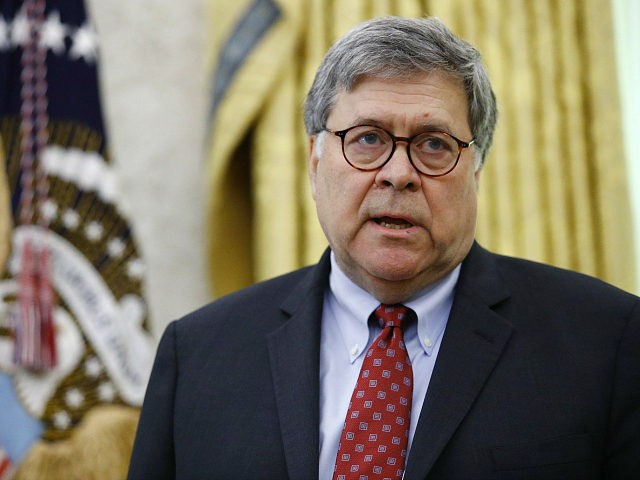China has intensified clandestine efforts to “coerce” American corporate leaders into serving as “lobbyists” and potentially illegal “foreign agents” to further its communist objectives, U.S. Attorney General (AG) William Barr warned Thursday.
Some business leaders voluntarily “become pawns of Chinese influence” to protect their profits, Barr noted in remarks prepared for a speech on China policy at the Gerald R. Ford Presidential Museum in Michigan.
Barr acknowledged that China is waging an “economic blitzkrieg” to replace America as the top superpower. The offensive at the hands of the Chinese Communist Party (CCP) is also targeting Hollywood and American academia.
Barr, the U.S. Department of Justice (DOJ) chief, said:
U.S. Department of State / YouTubeThe CCP has long used public threats of retaliation and barred market access to exert influence. More recently, however, the CCP has also stepped up behind-the-scenes efforts to cultivate and coerce American business executives to further its political objectives — efforts that are all the more pernicious because they are largely hidden from public view.
As China’s government loses credibility around the world, the Department of Justice has seen more and more PRC [People Republic of China] officials and their proxies reaching out to corporate leaders and inveighing them to favor policies and actions favored by the Chinese Communist Party.
Beijing’s objectives vary, but their method is generally standard, Barr said, noting that China targets businesspersons with economic interests in the PRC and suggests that their prospects for profit are contingent upon their response to its demands.
The AG continued:
Privately pressuring or courting American corporate leaders to promote policies (or politicians) presents a significant threat, because hiding behind American voices allows the Chinese government to elevate its influence and put a “friendly face” on pro-regime policies.
U.S. lawmakers or policymakers who hear of pro-PRC proposals from a fellow American tend to be more receptive to that constituent than a foreigner, Barr pointed out.
“By masking its participation in our political process, the PRC avoids accountability for its influence efforts and the public outcry that might result if its lobbying were exposed,” he added.
The top law enforcement official in the United States cautioned that U.S. companies and institutions currently kowtowing to the CCP, willingly and unwittingly, may be violating the Foreign Agents Registration Act (FARA), noting:
America’s corporate leaders might not think of themselves as lobbyists. You might think, for example, that cultivating a mutually beneficial relationship is just part of the “guanxi” — or system of influential social networks — necessary to do business with the PRC. But you should be alert to how you might be used, and how your efforts on behalf of a foreign company or government could implicate the Foreign Agents Registration Act. FARA does not prohibit any speech or conduct.
The law does require those who serve as “agents” of foreign principals to disclose that relationship and any political or other similar activities by registering with the DOJ.
That allows the American public to take into account the origin of the speech when evaluating its credibility.
U.S. lawmakers did not design FARA to muzzle Americans’ First Amendment-protected rights to free expression, but rather to ensure that the American public and its lawmakers can detect what or who is the real source of speech on matters of widespread concern.
Through its influence operations, the CCP, “the world’s most powerful violator of human rights,” seeks to “infiltrate, censor, or co-opt” American academia, Hollywood, and corporations like big tech, Barr said.
“All too often, for the sake of short-term profits, American companies have succumbed to that influence — even at the expense of freedom and openness in the United States. Sadly, examples of American business bowing to Beijing are legion,” he stressed.
Some American companies are benefitting, directly or indirectly, from China’s enslavement of Muslim minorities, particularly Uyghurs, the Australian Strategic Policy Institute (ASPI), a non-partisan think tank, reported this year.
Barr acknowledged that nowadays, the public is quick to call out corporate appeasement. He urged American companies to marshal their “wisdom, ingenuity and resources” to prevent China from destroying the U.S. free enterprise system.
Barr pointed out:
Following the recent imposition of the PRC’s draconian national security law in Hong Kong, many big tech companies, including Facebook, Google, Twitter, Zoom, and LinkedIn, reportedly announced that they would temporarily suspend compliance with governmental requests for user data. True to form, communist officials have threatened imprisonment for non-compliant company employees.”
China is pursuing its nefarious and even illegal ambitions through industrial espionage, theft, extortion, cyberattacks, malign influence activities, currency manipulation, tariffs, quotas, state-led strategic investment and acquisitions, and forced transfer of intellectual property, state subsidies, and dumping.

COMMENTS
Please let us know if you're having issues with commenting.